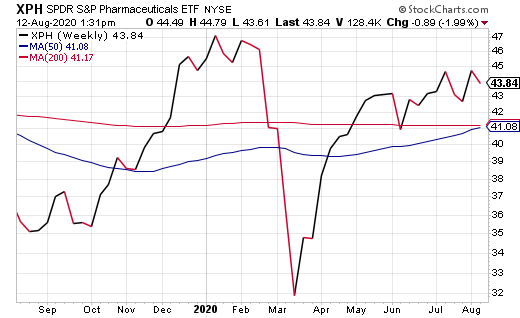Kamala Means Lotus
- Kamala Means Lotus
- ETF Talk: Invest in U.S. Pharmaceuticals with This Fund
- Protect Yourself in Style
- The Occam’s Razor of Productivity
- St. Augustine at Night
***********************************************************
Kamala Means Lotus
In Greek mythology, a lotus is a legendary plant whose fruit induces a dreamy forgetfulness and a sort of indolent stupor reminiscent of paralytic intoxication.
That sense of intoxication is what many Democrats are feeling today, as they know that another “lotus” has become the party’s presumptive vice-presidential nominee. You see, “Kamala” means “lotus” in Sanskrit.
Perhaps she was the obvious choice in this most-unusual election year’s “veep stakes.” I mean, the junior senator from my home state of California checks off nearly all of the boxes required to garner widespread support among Democrat loyalists.
Kamala Devi Harris is…
- An experienced politico
- A graduate of historically Black Howard University
- Proud of her prosecution of business, particularly the “Big Banks”
- “The best-looking attorney general,” according to President Obama
- A bold and vocal critic of President Trump and other administration officials
- A woman
- A woman of color
Oh, did I mention that Sen. Harris is a woman and a woman of color?
Indeed, in the identity-politics matrix of the Democratic Party, this lotus is an intoxicating mix of all things “good.”
Of course, she isn’t immune to criticism from her own, and particularly from progressives. In fact, some in the far extremes of the progressive movement have called her a “phony progressive” and have criticized Joe Biden for selecting a “top cop” like Harris in the midst of the current protests against what they call “excessive policing.”
Perhaps the greatest take-down of this sort involving Harris was delivered by the most-interesting Democrat to seek the nomination last year, Rep. Tulsi Gabbard. During a debate in July 2019, Gabbard criticized Harris’ aggressive record as a “drug warrior” and essentially called her a hypocrite.
Of Harris, Gabbard said she “put over 1,500 people in jail for marijuana violations and then laughed about it when she was asked if she ever smoked marijuana.”
Gabbard went on to express her deep concerns about Harris’ prosecutorial record, saying, “There are too many examples to cite, but…she blocked evidence that would have freed an innocent man from death row until the courts forced her to do so. She kept people in prison beyond their sentences to use them as cheap labor for the state of California. And she fought to keep the cash bail system in place that impacts poor people in the worst kind of way.”
Ouch!
Yet despite the critics on her own team, there is no doubt in my mind that progressives, mainstream Democrats and conservative Democrats (if there’s still such a thing) will coalesce in support of “the Lotus.”
Why? Because the Lotus offers up the promise of the one thing all Democrats, as well as nearly 60% of the American public (if the polls are correct), want to see happen in November — and that is the ousting of the current occupant of the White House.
Oh, and one more interesting thing of note here about The Lotus, she does seem to have been aptly named.
You see, the lotus flower has an interesting life cycle. Its roots are based in mud. And in the marsh lands of its native India and Vietnam, the lotus is submerged each night into the murky rivers it calls home. In the morning, the lotus blooms again without a hint of muddy residue on its petals.

It seems like a fitting metaphor for a life cycle spent in the Washington swamp.
***************************************************************
ETF Talk: Invest in U.S. Pharmaceuticals with This Fund
(Note: Second in a series on pharmaceutical ETFs)
The SPDR S&P Pharmaceuticals ETF (NYSEARCA: XPH) tracks an equal-weighted index of U.S. pharmaceutical companies.
The exchange-traded fund (ETF) seeks to provide exposure to the pharmaceuticals segment of the S&P TMI. The ETF offers modified equal-weighted exposure to roughly 30 U.S. pharmaceutical companies, including large-, mid- and small-cap stocks.
The fund’s weighting scheme causes it to be far less concentrated than the industry itself, which is dominated by a handful of mega-cap names such as Johnson & Johnson (NYSE: JNJ), Pfizer Inc. (NYSE: PFE) and Merck (NYSE: MRK). Its heavy tilt towards mid- and small caps makes for a rather volatile fund relative to other equities in the same industry.
XPH sees significant daily trading volume with small spreads, allowing liquidity for investors who make block trades. The fund lets investors take strategic or tactical positions at a more targeted level than traditional sector-based investing.
The fund’s top holdings include Horizon Therapeutics Public Limited Company (NASDAQ: HZNP), 6.80%; Catalent Inc. (NASDAQ: HZNP), 5.22%; Jazz Pharmaceuticals Plc (NASDAQ: Jazz) 4.96%; Zoetis, Inc. Class A (NYSE: ZTS), 4.88%; and Pfizer Inc. (NYSE: PFE) 4.69%. Plus, the fund is heavily weighted in Pharmaceuticals (55.02%), Bio Therapeutic Drugs (21.5%) and Veterinary Drugs (9%).

Chart Courtesy of StockCharts.com
The fund has $247.05 million in assets under management and currently trades around $45 per share. XPH seeks to provide investment results that, before fees and expenses, correspond generally to the total return performance of the S&P Pharmaceuticals Select Industry Index. The fund is very efficient, offering a low fee and tight tracking that lags by less than XPH’s expense ratio. Overall, XPH is a solid way to capture a less-concentrated version of the pharmaceuticals market.
As always, I urge any interested investor to exercise due diligence in deciding whether or not this fund is suitable for individual portfolio goals.
Remember, I am happy to answer any of your questions about ETFs, so do not hesitate to send me an email. You just may see your question answered in a future ETF Talk.
*******************************************************************
Protect Yourself in Style
Okay, so we all have to wear masks to help prevent the spread of COVID-19.
That’s just good science, and I am a big fan of good science. But I also like to look good while promoting good science. That’s why I’ve decided to make my own masks, and to make those available to you with my new Way of the Renaissance Man masks.

Protect yourself and those you care about in style with these handmade, 100% polyester masks that come with a sleeve to insert a greater level of protection with an N95 filter insert (not included).
Combat coronavirus in style, and always have a clean one handy by getting two or more now! The masks retail for $19.99 each, but today I’ve discounted the price to $14.99.
And as a special bonus offer for The Deep Woods readers, take another 20% off your order when you buy two or more.
Simply use the promo code: DEEPWOODS20 to get your special subscriber pricing.
Hey, protect yourself and look good doing it. Now, what could be cooler than that?
******************************************************************
In case you missed it…
The Occam’s Razor of Productivity
Want to achieve more in life? Of course, you do. The fact that you read this e-letter basically tells me just that. Yet for most of us, the idea of achieving more comes with the corollary notion that we are going to have to do a lot more, put in more hours, work harder and generally take on more and more tasks and responsibilities.
Yet what if doing less could allow you to achieve more? Now, when I say, “doing less,” I am not talking about slacking off and just letting fate’s wind sail you across life’s lake. What I am referring to here is taking on fewer overall tasks and really concentrating on getting the critical things in life right.
Another way to describe this principle in action is to hone your focus on the most important tasks at hand, and thereby become a “master of selectivity.” You see, it is by concentrating your efforts on the most important priorities needed to achieve your goals, and letting go of extraneous and often distracting tasks, that you can enhance your performance in business and in life.
This idea of mastering selectivity and prioritizing tasks was the subject of a Wall Street Journal article titled, “How to Succeed in Business? Do Less,” by Morten Hansen, former management consultant and now professor of management at the University of California, Berkeley.
In the article, Hansen explained how his strategy for success at his “dream job” at Boston Consulting Group was to work exorbitant hours, a practice which he said often resulted in 90-hour workweeks. Yet despite all his time and hard work, there was one colleague he had that put in far fewer hours, yet always had better solutions to problems than he did. Moreover, this co-worker put in a normal 8 a.m. to 6 p.m. day, never stayed late and never worked nights or weekends.
So, was this outperforming co-worker just that much smarter and talented than Hansen (as well as the rest of his colleagues)?
What Hansen discovered later in his academic research is it’s not a case of “talent” or “natural ability” or the willingness to “work hard” that can result in successful outcomes. Rather, researchers have found that what is even more important to success is the ability to master selectivity.
“Whenever they [top performers] could, they carefully selected which priorities, tasks, meetings, customers, ideas or steps to undertake and which to let go,” wrote Hansen. “They then applied intense, targeted effort on those few priorities in order to excel.”
Hansen’s research also found that just a select few critical work practices accounted for as much as two-thirds of the variation in performance among the subjects in a 2011 research study. “Talent, effort and luck undoubtedly mattered as well, but not nearly as much,” wrote Hansen.
So, how did the best performers in his study do this?
According to Hansen, “Rather than simply piling on more hours, tasks or assignments, they cut back.” Hansen then likened this ability to cut back and focus on what really makes the most difference to the philosophical principle known as Occam’s Razor. Named after the philosopher and theologian William of Ockham, this principle stipulates that the best explanation in matters of philosophy, science and other areas is usually the simplest.
“At work, this principle means that we should seek the simplest solutions — that is, the fewest steps in a process, fewest meetings, fewest metrics, fewest goals and so on, while retaining what is truly necessary to do a great job,” wrote Hansen. “I usually put it this way: As few as you can, as many as you must.”
I like to apply this principle to my own life via something called the “minimum effective dose.” What this means is you want to concentrate on doing the things that have the most impact on your results, and that have the fewest extraneous elements and/or time commitments.
For example, in the realm of fitness, I engage in what’s known as high-intensity training, or HIT, to get the best strength and conditioning results in the briefest period of time, and in the safest, most efficient manner.

Your editor engaged in the ultra-difficult, ultra-productive and supremely time-efficient high-intensity training protocol.
When investing and selecting top-performing companies for my Successful Investing, Intelligence Report and Bullseye Stock Trader newsletter advisory services, I concentrate on finding stocks with the strongest earnings, strongest relative share-price performance and stocks that are in the strongest industry groups. By focusing on these key components and filtering out much of the “noise” of extraneous data, I am better able to make good investment choices.
Finally, the principle of focusing more on less, i.e. focusing your effort on the most critical elements of a task or objective rather than becoming sidetracked by the superfluous, is something we can all apply to nearly every part of our lives.
So, if you want to achieve success in any walk of life, focus on the critical elements — and then get them right. Once you do that, you’ll often find the rest tends to fall into place.
*******************************************************************
St. Augustine at Night
Well, I never put off ’til tomorrow
The things I shoulda done today
No, I’ve always waited
Way longer than that…
–Dawes, “St. Augustine at Night”
The new album from indie folk-rock band Dawes is a gem of beautiful melodies sung to melancholy yet intricate and emotion-evoking lyrics. In the song “St. Augustine at Night,” the protagonist reveals his tendency to procrastinate way too much, a tendency that most of us face from time to time.
Of course, I am not endorsing this tendency, as it’s not conducive to achieving one’s objectives. Rather, by recognizing a nagging flaw that plagues most of us, myself included, I am better positioned to identify and conquer it. Hey, it’s just a fact that we all have flaws we need to overcome and admitting those flaws is the first step in fixing them.
Wisdom about money, investing and life can be found anywhere. If you have a good quote that you’d like me to share with your fellow readers, send it to me, along with any comments, questions and suggestions you have about my newsletters, seminars or anything else. Click here to ask Jim.
In the name of the best within us,

Jim Woods


